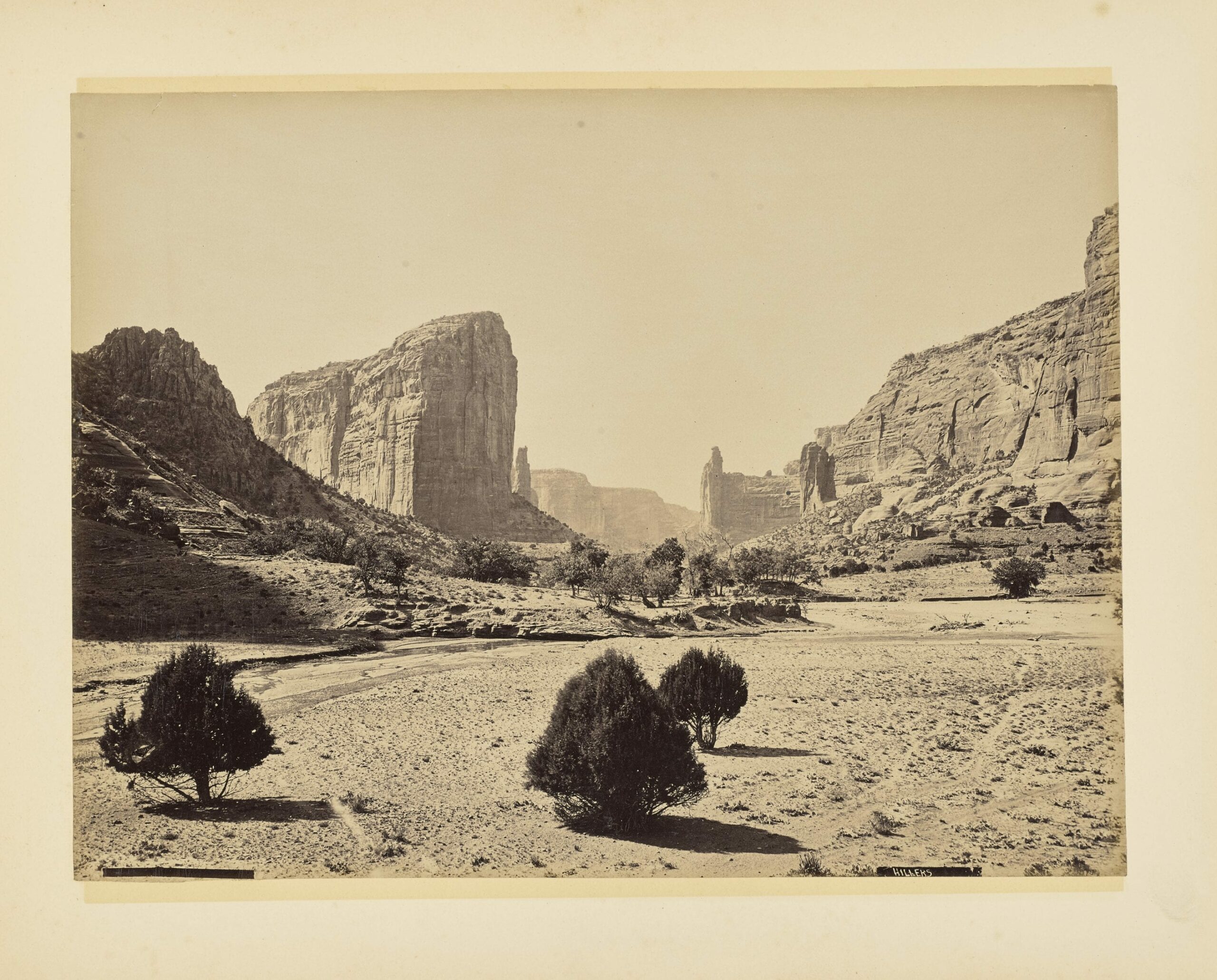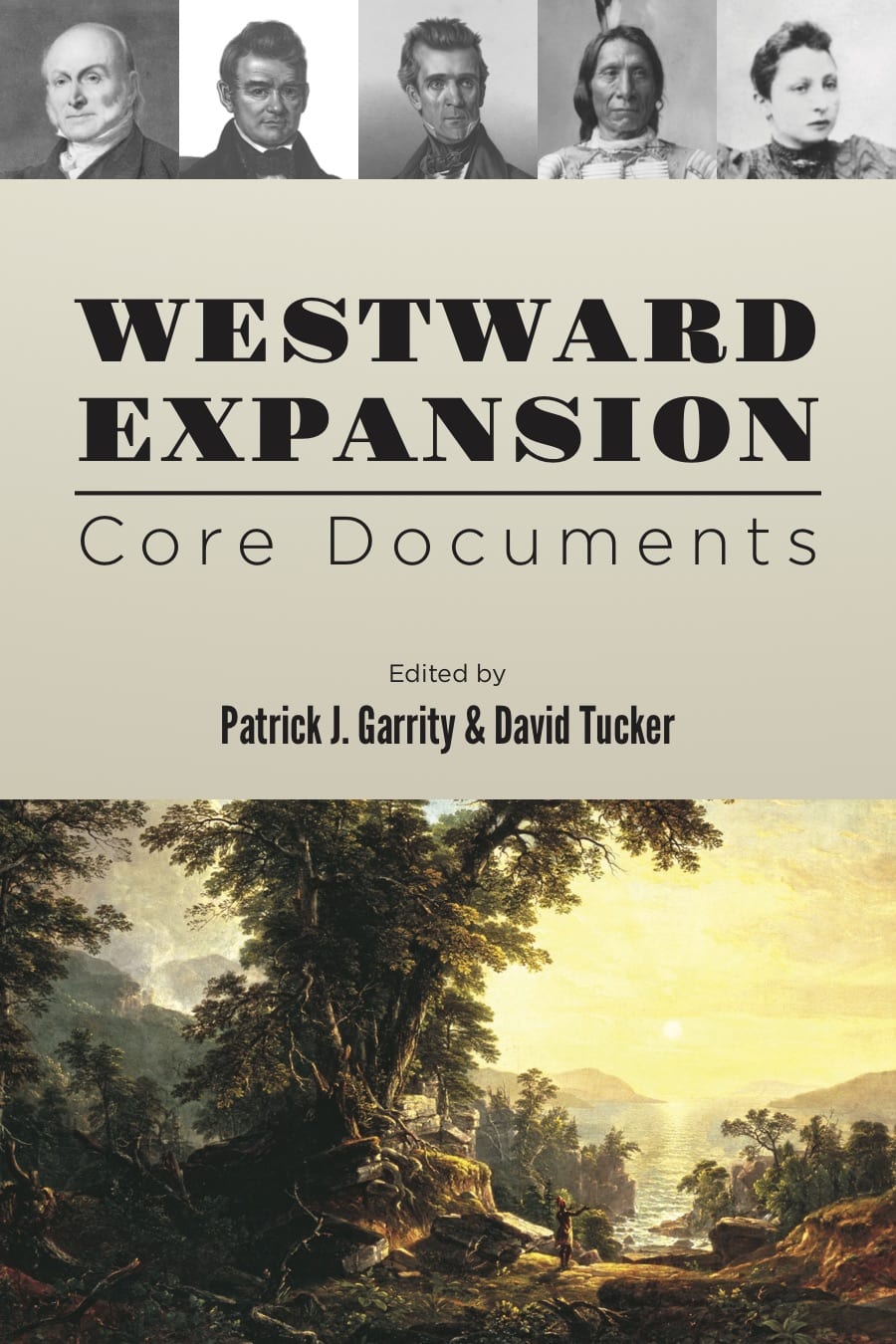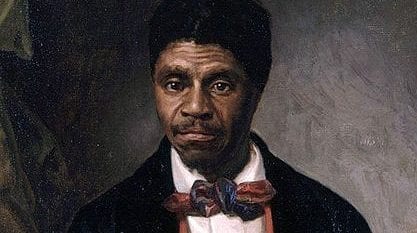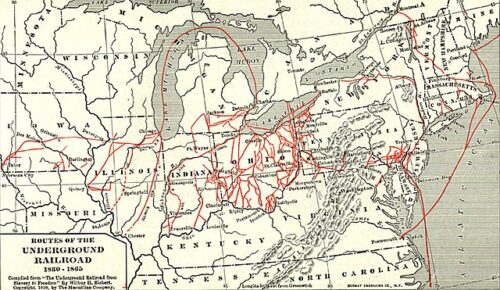
Westward Expansion
The first Europeans to land in America traveled west to do so. Their descendants continued moving west for the next 250 years. They were joined by other Europeans in this migration, as well as African-Americans and Native Americans—some moved forcibly. In time their westward movement brought them into contact with Pacific Islanders and Asians, some of them immigrants to the expanding United States. The documents in this collection present the reasons Americans gave for and against westward expansion and their thoughts on the political, moral, and economic issues it raised. Preeminent among these issues were slavery and the fate of the Native Americans. Americans were also concerned about where and when westward expansion should end and the effect that its ending would have on the nation. The documents and images in this volume also present the experiences of settlers, explorers, farmers, former slaves, and Indians struggling to build new lives in the west or hold on to aspects of their old lives as westward expansion transformed the land, those who lived on it, and the United States itself.
To understand this story, it is wise to avoid presentism—applying today’s standards and sentiments to the past—even while rightly maintaining our moral objections to blatant racial prejudice and injustice. We must take into account the facts as they were as well as the perspectives of politicians, businessmen, and ordinary citizens. Three facts stand out.
First, there was the search of the European settlers and their descendants for a better, freer life, coupled with a massive demographic wave, fed by immigration. The American Revolution and the Constitution were designed to enable that better life under a novel form of government—a federal democratic republic. There were no barriers that any government of the time, much less that envisioned by the Founders, could have erected to stem the tide of a restless, enterprising people. The Founders instead intended to manage expansion carefully so that it would be republican in character. They established a template by which territories not yet fully settled, or newly acquired, would follow a distinct path to statehood, at which point they would enter the Union under the Constitution, on par with the other states.
Second, there were geopolitical realities which not unreasonably created an imperative for expansion. Some leaders, like Thomas Jefferson, occasionally speculated that westward migration might lead to friendly sister republics on the other side of the Mississippi, but most feared that these would eventually come into conflict with one another, unless united under one federal head. In the worst case, foreign powers would create client states or occupy the western territories themselves, bringing the United States into the maelstrom of European monarchical balance of power rivalries and wars. American statesmen believed that unless the United States became a transcontinental power with no strategic rivals, its republican form of government could not survive. Territorial expansion would be peaceful, orderly, gradual and limited to North America, allowing the United States to expand its commerce overseas.
Third, this ideal model of expansion was complicated—to say the least—by a two-fold clash of cultures, or civilizations. The American lands were already occupied by peoples with very different views of what was meant by a better, freer life. Romantic views of the frontier aside, life for the settlers was often very hard. Farmland, individually owned, provided their primary means of existence and hope of a better future. The Indian nations, or tribes, largely held a communal view of land, and claimed extensive holdings. As migration increased, native Americans became far fewer in number than the settlers, and it is only recently that we have realized fully the degree to which diseases carried over from Europe greatly weakened the tribes. The migratory swarm of Americans seeking land, many of them honest and law-abiding, some not, was bound to cause tension and conflict. During negotiations, who could speak authoritatively for the tribes was often in dispute, creating opportunities for misunderstandings and often fraud. As the documents reveal, the U.S. government and private organizations generally tried to do the right thing, by their own lights and the Anglo-American concept of justice. But facts on the ground never allowed full and satisfactory resolution of the civilizational differences.
The other clash was within the Union itself, between the increasingly democratic capitalistic north and the oligarchic system of slavery of the south—with the future of the west, and western expansion, very much at stake. The north gradually eclipsed the south in terms of population and wealth, especially as the old northwest entered the Union and anti-slavery sentiment grew (if not a desire for racial equality). The south demanded compensation, in terms of favorable laws, and territorial arrangements and acquisitions that assured a sectional balance. Some politicians, such as James Polk (1795-1849), thought that expansion would ameliorate these sectional tensions by creating a higher national purpose that would unite north and south. The war with Mexico proved exactly the opposite, as did proposals to expand or condone slavery to the southward. Had the southern Confederacy succeeded in the Civil War, the two Americas undoubtedly would soon have disputed possession of the unincorporated western territories and California. Both nations would have been inclined to expand further north and south to balance the other. Abraham Lincoln (1809-1865) resisted secession in part to prevent the geopolitical and moral nightmare of a slavocracy in North America, probably aligned with a hostile European power, rivaling the free republic of a diminished United States.
The drive for continental expansion ceased in the generation after the Civil War (Mormonism and Jesuitism), except for the purchase of Alaska. But towards the turn of the twentieth century, some Americans argued for the need to establish overseas colonies (The Significance of the Frontier in American History, My Story) while others argued that this would be a violation of the nation’s republican principles. Whereas this volume focuses on expansion that resulted in the admission of new states, a forthcoming volume (American Foreign Policy) will cover in detail the story of America’s relations with foreign powers and its acquisitions that remained territories.
Acquiring Territory
- Letter to John Breckinridge
- Speech on the Constitutionality of the Louisiana Purchase
- The Transcontinental Treaty and American Expansion
- Seventh Annual Message to Congress (Monroe Doctrine)
- Special Message to Congress (Tyler Doctrine)
- Annexation
- Special Message to Congress on Mexican Relations
- The Destiny of America, Speech at the Dedication of Capitol University, Columbus, Ohio
- Speech on the Cession of Russian America to the United States
- The Annexation of Hawaii
- The March of the Flag, Campaign Speech
- Address Accepting Democratic Presidential Nomination
- Downes v. Bidwell
Territories to States
Indians
- Report on Indian Affairs
- Second Annual Message to Congress
- Indian Removal
- Worcester v. Georgia
- Report of the Commissioner of Indian Affairs
- The Visit of Red Cloud to Washington, D.C.
- First Annual Message to Congress
- Americanizing the Indian
Slavery
- Letter to the Editors of the National Intelligencer Opposing the Annexation of Texas
- Letter to Richard Pakenham, British Minister to the United States
- Speech on the War with Mexico
- Annual Message to Congress
- Speech on the Kansas-Nebraska Act and Racial Hierarchy in International Relations
Settler Experience
- Letters and Journals from the Oregon Trail
- Proclamation
- The Farmers’ Movement
- The Great Valleys and Prairies of Nebraska and the Northwest
- My Story
Westward Expansion and a Changing America
For each of the documents in this collection, we suggest below in section A questions relevant for that document alone and in section B questions that require comparison between documents.
The Northwest Ordinance
A. Why did Congress agree to admit new states on equal terms with the original thirteen members of the Union, and not as colonies or with limited rights? What constitutes republican government, and who decides on its meaning? Should the western territories been allowed to form a separate nation or nation, as some advocated? Should land have been given to new settlers to encourage their migration, or should it have been sold to allow the government to settle its debt and fund public projects such as education? Why did anti-slavery Congressmen support the inclusion of a fugitive slave clause?
B. In light of the later policy of the Washington administration toward the Indians, what did and should have constituted the “utmost good faith” towards the tribes? What might have happened if Congress had followed Jefferson’s earlier recommendation to exclude slavery from all western territories?
Report on Indian Affairs
A. What did Knox mean by an “honorable tranquility of the frontiers”? What in his view threatens this? How does he propose to achieve it? On whom and for what reason does he place most responsibility for improving relations with the native Americans?
B. How do the problems and solutions proposed by Knox compare with those of others who wrestled with the problem of American-Indian relations? Compare the following documents:
- Report of the Commissioner of Indian Affairs
- The Visit of Red Cloud to Washington, D.C.
- Arthur’s First Annual Message to Congress
- “Americanizing the Indian”
Letter to John Breckinridge
A. Why did Jefferson fear the establishment of a French empire by Napoleon in the Western Hemisphere? Should he have sought an alliance with Britain had Napoleon refused to deal with the United States? Should the American diplomats have declined the offer of the entire territory, and insisted instead just on New Orleans and the Floridas, if France had acquired them as well?
B. How did Jefferson’s plans for dealing with the Indians differ from those of his predecessors? Should Jefferson have sought a constitutional amendment—or agreement by all the states. What were the possible consequences of not doing so?
Speech on the Constitutionality of the Louisiana Purchase
A. What reasonable alternative was available to the United States, given the circumstances and Napoleon’s offer? On what grounds did the Federalists argue that the residents of Louisiana were unfit for republican government? The terms of the treaty aside, could the government constitutionally have ruled the territory as a colony indefinitely?
B. Why was slavery outlawed in the Northwest Territory but not Louisiana? How would Tracy have responded to Jefferson’s arguments?
The Transcontinental Treaty and American Expansion
A. Why would Adams limit American expansion to the northern hemisphere, but apparently exclude Latin America? Why no overseas possessions or colonies? How were peoples who spoke a different language and had a different culture and form of government — the Indians, Spanish-speakers, and French Canadians, among others — to be integrated into one people, especially if they resisted integration? How might the north American union be established peacefully, if at all?
B. Compare John Quincy’s arguments for expansion with those of John O’Sullivan.
Seventh Annual Message to Congress (Monroe Doctrine)
A. Why did Adams and Monroe decide not to cooperate with the British? How could the United States justify acquiring territories in the Western Hemisphere while denying that right to the absolutist European monarchies? Did America’s republican character matter? Would/should the United States have used military force to resist an invasion of South America or Mexico? Should it have sought a joint declaration with the newly-independent nations, rather than acting unilaterally? What if any relevance does the Monroe Doctrine have today, in a time of controversies over border security and national sovereignty in a globalized world?
B. How far up the coast of the Pacific northwest should the United States have been concerned? Why was the eventual acquisition of Cuba and Texas so important to the United States? Should it have resisted efforts by the South American nations to drive Spain out of Cuba?
Second Annual Message to Congress
A. Did Jackson make a persuasive argument for Indian removal? Was his comparison of the Indians leaving their land to go west and Europeans arriving in the United States, or Americans moving west accurate? In what ways were these movements of people similar or different? Why might a fellow frontiersman like Davey Crockett have opposed Jackson’s policy?
B. Compare Jackson’s approach to the native Americans in this address with the that of the Washington administration. How are they alike or different? How had the situation of America and Americans changed in the nearly 35 years since Henry Knox wrote the report to George Washington? What were the effects of Jackson’s policy? If Jackson had been aware of these effects, would that have caused him to change his removal policy? Should it have?
Indian Removal
A. What kind of arguments does Ross use to appeal to the American people? Do you think his arguments are persuasive? Which argument do you think is the strongest? What attitude towards the Indians does the military order instruct soldiers to take? What does the order mean when it states that “the Major General is fully persuaded that this injunction will not be neglected by the brave men under his command, who cannot be otherwise than jealous of their own honor and that of their country.”
B. Compare Ross’ argument with Justice Marshall’s in Worcester v. Georgia. Do Ross and Marshall make the same argument? How would you characterize any differences in the arguments?
Worcester v. Georgia
A. Justice Marshall raises the question of whether the state of Georgia had jurisdiction over the Cherokee. How does the history of European American and native relations bear on his answer to this question. Why do you think President Jackson refused to abide by the decision of the court?
B. Compare Justice Marshall’s argument with Ross’s in Indian Removal. Do Ross and Marshall make the same argument? How would you characterize any differences in their arguments? Do Ross and Marshall have the same interpretation of the treaties of Hopewell and Holston?
Letters and Journals from the Oregon Trail
A. Other than missionary activity, what motivated women like Narcissa Whitman and their families to migrate west? Why did the settlers retain their connection with the Union and not attempt to establish a separate nation? What effect did disease have in the settlement of the west?
B. How did relations with the native tribes in the west differ from those of the east and south at this time. Use these documents:
What affinities and resentments did the tribes have with the settlers? Why did President Polk not resort to war with Britain to settle?
Special Message to Congress (The Tyler Doctrine)
A. Why did the United States not make a tripartite agreement with Britain and France, or outright annex Hawaii at this time? What responsibilities did the United States have to its citizens and merchants outside its sovereign territory? What pressures did this create for territorial and/or commercial expansion?
B. Why and how did slavery affect the decisions about territorial expansion? Were there geographical or political limits to the expansion of a confederal republic?
Letter to the Editor of the Washington National Intelligencer Opposing the Annexation of Texas
A. What reasons would the United States have to seek the annexation of Texas at this point, nearly a decade after it had declared its independence? What would the United States have done if the government of Texas had refused the terms of annexation, as some Texians wished to remain independent? What might have been the long-term effects of an independent Texas Republic on the future of slavery and U.S. security?
B. Why would Clay, who had strongly advocated the acquisition of Texas during the negotiations with Spain over what became the Transcontinental Treaty, now oppose it? Why did he fear that Britain or France might go to war with the United States on behalf of Mexico?
Letter to Richard Pakenham, British Minister to the United States
A. Why would Calhoun deliberately interject the issue of slavery into the matter of expansion and the annexation of Texas? Could the United States have accepted an independent Texas, with or without slavery, allied with Britain? What effect might that have had on future American expansion?
B. How would Calhoun respond to the arguments of Clay in the Raleigh letter? Would the prospects for sectional harmony, and further expansion, have been increased by the division of Texas into a free and a slave state?
Annexation
A. On what grounds does O’Sullivan justify American annexation of Texas? If the government and voters of Texas had disapproved annexation, how might O’Sullivan have reacted? Should the United States have made annexation contingent on a Texas constitution free of slavery? What might have happened had the Republic of Texas remained independent? O’Sullivan speaks of the continuing growth of the United States as resulting not from the “agency of our government” or the “responsibility of our people,” but from “the natural flow of events, the spontaneous working of principles, and the adaptation of the tendencies and wants of the human race to the elemental circumstances in the midst of which they find themselves placed.” Does the historical record support O’Sullivan’s claim?
B. How do O’Sullivan’s arguments in favor of annexation differ from those of Calhoun? How might have Clay responded?
Special Message to Congress on Mexican Relations
A. Why was Polk so anxious to secure California and New Mexico? Was the United States justified in sending troops into disputed territory, even if supposedly justified by military necessity? Should Polk have insisted on the acquisition of all of the Oregon Territory? Should the United States have abandoned its claim to the Rio Grande border?
B. Was Henry Clay correct in predicting that war with Mexico was the inevitable result of Texas annexation, or were there means to avoid war, such as further diplomacy? What arguments might Congressmen might have made for and against a declaration of war had the clash between U.S. and Mexican forces not taken place?
Speech on the War with Mexico
A. On what grounds did Lincoln and opponents of the war object to its constitutionality? Why did Lincoln, an anti-slave Whig (but not an abolitionist) not explicitly raise the question of slavery in his speech? On what grounds might Lincoln have supported territorial expansion? Why did he choose to use—selectively—language similar to that of the Declaration of Independence in his argument about the legitimate control and governance of territory?
B. How would Lincoln have responded to John O’Sullivan’s arguments about expansion? If the war had gone badly and Mexico had occupied part of the United States, would Lincoln have approved a peace in which the United States surrendered territory to Mexico?
Annual Message to Congress
A. Would Polk have increased or moderated his territorial demands if the war had continued— if the latter, what would he have settled for? Would the opponents of war and territorial acquisition have changed their minds had they known about the discovery of gold in California? Why did Polk’s belief that the slavery issue would be set aside in the wake of expansion be proven wrong?
B. Why did Polk take a more aggressive policy line than the Manifest Destiny approach advocated by John O’Sullivan? If the latter approach had been followed, what might the territory of the United States look like today, and what might be its political and social character? Or if the United States had taken most or all of Mexico? Or had not expanded further than it had in 1846?
The Destiny of America
A. Why is Seward apparently so confident that the slavery issue would be resolved, thus clearing the way for future expansion? Given his argument, is there any logical geographic limit to expansion and the incorporation of new territories into the Union? How do his arguments about globalization based on a common humanity compare with those of today?
B. How does Seward’s vision of expansion differ, if at all, from those of John Quincy Adams and John O’Sullivan? Why is he more territorially ambitious than his recently deceased Whig colleague, Daniel Webster?
Speech on the Kansas-Nebraska Act and Racial Hierarchy in International Relations
A. Why was a northern route for the transcontinental railroad so important to Douglas? What would have been the effect of a southern route, through Texas, as many southerners preferred? Would it have increased or lessened their interest in expansion? What if Taney had ruled that those of African descent were citizens, and that slavery was prohibited in all current and future territories?
B. What might have happened had Stephen Douglas, rather than Lincoln, been elected president in 1860? What might have happened had Lincoln agreed to compromise, by permitting slavery in any new territory that might be acquired below 36-30? In that case, would the annexation of Canada as free territory have created a sustainable sectional balance?
Proclamation of the Vigilance Committee of San Francisco, June 9, 1856
A. Does the Committees’ proclamation justify their actions? They appeal to the power of the people and the rights of the majority. Do they provide sufficient protection for the rights of the minority? We accept the argument of the Declaration of Independence that the people have the right to change their government, but was it applied correctly in this case? How do we determine if the power of the people is organized and expressed legitimately? Is the Committee of Vigilance different from a lynch mob? Does the fact that the committee became a political party and won elections prove its actions justified?
B. Are the Cherokee and the Hawaiians appealing to the same principles as the San Francisco Vigilance Committee? Why did the Vigilance Committee prevail and the Cherokee and Hawaiians fail in their efforts to organize and protect their different ways of life?
Speech on the Cession of Russian America to the United States
A. Why does Sumner reject the arguments of Jefferson? Of Jackson? Why does he think that the acquisition of Alaska will cement the political as well as economic unity of country? What might the principal arguments against the purchase be? What would have been the consequences of British acquisition of Alaska?
B. How would have Sumner assessed the arguments of O’Sullivan? or Seward for expansion? Which, if any, of the policies would you recommend—or reject—for treating the indigenous population of Alaska? Use these documents:
- Jackson’s Second Annual Message
- Report of the Commissioner of Indian Affairs
- Arthur’s First Annual Message
- “Americanizing the Indian”
Report of the Commissioner of Indian Affairs
A. Are Parker’s comments about the uncivilized character of the Indians surprising, since he was himself an Indian? Why do you think Parker considers the Indians uncivilized? Why did Grant think that owning land as individuals, instead of the tribe owning the land for all its members, would make the Indians more civilized? What does he think is the best way for the government to deal with native Americans? Why does he believe that it is inappropriate for the United States to make treaties with the Indians? Was Parker right that what he calls a philanthropic approach to the Indians was harmful?
B. Compare Parker’s view of making treaties with the Indians with the account given by Chief Justice Marshall. Which seems the correct view? How does the new approach described by Parker in the beginning of his report differ from the approaches advocated by Henry Knox and Andrew Jackson?
The Visit of Red Cloud to Washington, D.C.
A. What does the episode with the cannons in the Washington Naval Yard tell us about how official Washington and the native Americans understood each other? How would you characterize the attitudes of Secretary of the Interior Cox and Red Cloud? Given that the Sioux were displacing the Crow, was Red Cloud right to protest the displacement of the Sioux? Are the two situations comparable? How might they differ?
B. Considering Jackson’s Second Annual Message and the Indian Removal document collection, had 40 years of additional experience changed the attitudes or problems between native Americans and Americans? What are the fundamental problems between them?
The Farmer’s Movement
A. Based on the excerpts of the Kansas Association and the Grange, what would you say are the differences between the two organizations? Why does the Grange highlight that In our noble Order there is no communism, no agrarianism”? Why are the farmers concerned with traiffs? What does their debate on the resolution show to be their attitude toward them?
B. Compare the final lines of the document with the final lines of the Declaration of Independence. What similarities do you see? Why do you think they exist? In “Americanizing the Indian”, reformers propose to civilize the Indians by making them farmers. Based the Farmer’s Movement document collection, what do you think they meant by civilizing the Indians?
The Great Valleys and Prairies of Nebraska and the Northwest
A. Wilber makes disparaging remarks about native Americans. How is his attitude toward the Indians connected to what he says about rain following the plow?
B. Compare Wilber’s argument with the evidence presented in the image of the Powell Map.
First Annual Message to Congress
A. What did President Arthur mean when he spoke of “civilized life”? Why did he think that individual ownership of land would lead to or make more likely a civilized life? Why does Arthur put such emphasis on education, not just for native Americans, but for other Americans as well?
B. How do the U.S. government policies announced in these documents differ? What remains constant? Use these documents:
- Report on Indian Affairs
- Jackson’s Second Annual Message
- Report of the Commissioner of Indian Affairs
Americanizing the Indian
A. Why did the participants at the Mohonk Conference think that the Dawes Act would help civilize the Indians? What did the participants at the Conference see as the problems facing the Indians even after the Dawes Act? What were the different ways they proposed to deal with these problems? Does the analogy that speakers drew between the Indians and the former slaves seem reasonable? Is the minority report correct in arguing that Dawes Act is contradictory in arguing that the Indians are like other men, but unlike other men require continued protection?
B. Compare the arguments and plans of the Friends of the Indians with the arguments and proposals in the following documents.
- Report on Indian Affairs
- Jackson’s Second Annual Message
- Indian Removal
- Worcester v. Georgia
- Report of the Commissioner of Indian Affairs
- The Visit of Red Cloud to Washington, D.C.
- Arthur’s First Annual Message
Do certain attitudes towards and plans for the Indians remain constant in all the documents? What are the differences?
The Ghost Dance Religion among the Sioux
A. How do the accounts of Kicking Bear and Mrs. Parker differ? Do they present the same facts about the dance? Do they present the same facts in the same way? Is Selwyn suspicious of Kuwapi from the beginning of his questioning of him? Is he asking him questions designed to get answers that he wants?
B. How do you think the Friends of the Indians (Americanizing the Indian) would have responded to these accounts of the Ghost Dance? What would they have thought of references to a Messiah and resurrection? What do you think the Indians meant by such terms?
Mormonism and Jesuitism
A. Why does Gunsaulus attack both what he calls Jesuitism and Mormonism? What is the common threat he thinks they pose? Why does he think the threat from Catholicism is greater than the Mormon threat? What does Gunsaulus offer as an alternative in each case? Why do you think the Commission called itself the New West Education Commission?
B. The Northwest Ordinance states that “Religion, morality, and knowledge, being necessary to good government and the happiness of mankind, schools and the means of education shall forever be encouraged.” Was the New West Education Commission acting in accordance with the Northwest Ordinance? How does the attitude of the Commission toward Catholics and Mormons compare with the attitude toward the Indians? What are the similarities and difference in the attitudes of Gunsaulus and President Arthur toward the west?
Plenty Horses Kills Lieutenant Casey
A. How would you describe the attitude of McGillycuddy toward the Indians? Why does he quote Red Cloud and Little Wound? Why does he think the fighting and Wounded Knee occurred?
B. How do you think the Friends of the Indians (Americanizing the Indian) would have responded to the statement of Plenty Horses at his trial? Given the reports on the Ghost Dance, was McGillycuddy right in his assessment of the Ghost Dance?
The Significance of the Frontier in American History
A. Why does Turner believe that the frontier west, not the coastal east, defines the American character? Why does Turner regard slavery as part of the story of the frontier and American expansion?
B. How did violence represent and shape the American Western character? How might Turner have responded to Rev. F.W. Gunsaulus’s warnings about Mormonism and Jesuitism in the West? How does the frontier experience described by Turner compare with the actual experiences of Narcissa Whitman and Rachel Calof?
My Story
A. If Calof had known as an 18 year old woman what life would be like in the early years in North Dakota do you think she would have agreed to marry Abraham? Why do you think Rachel and Abraham were able to persevere as pioneers when others did not?
B. Compare Calof’s account with Whitman’s. What are the differences? What accounts for them?
The Annexation of Hawaii
A. Should the United States have annexed the Hawaiian islands?
B. Compare the arguments for and against the United States taking control of the Hawaiian islands with those made about Indian lands and Louisiana. Do the arguments differ? In each case, what was the relative importance of principle (the rule of the people) and practical considerations? Use these documents:
- Jackson’s Second Annual Message
- Indian Removal
- Worcester v. Georgia
- Letter to John Breckinridge
- Speech on the Constitutionality of the Louisiana Purchase
The March of the Flag Campaign Speech
A. Why does Beveridge praise past American continental expansion, when he says that it was unnecessary? Was it possible to extend American global commerce without territorial expansion? Would he have been content merely with the lands gained from Spain, including the Philippines, or might he have urged further expansion?
B. Would John Quincy Adams have approved Beveridge’s invocation of the law of political gravitation extension beyond the North American continent? Does Beveridge’s argument about governing foreign peoples differ from the racial hierarchy proposed by R.M.T. Hunter? From the various plans to govern the Indian peoples at home. Use these documents:
- Report of the Commissioner of Indian Affairs
- The Visit of Red Cloud to Washington, D.C.
- “Americanizing the Indian”
- Arthur’s First Annual Message
Address Accepting Democratic Presidential Nomination
A. Why would McKinley have decided to annex the Philippines as a U.S. territory rather than allow it to become independent under U.S. protection (which was done with Cuba)? What if the United States had allowed Spain to retain legal sovereignty over the islands, or simply sailed away? What might have been the consequences for the United States if there had been a great power war over the Philippines, or its possessions by Britain, Germany, or Japan?
B. How would the United States have enforced the Monroe Doctrine had it been extended to the Philippines — would this not have required an expansion of the Army and Navy? How does Bryan’s argument against compare with previous cases against expansion? Use these documents:
- Speech on the Constitutionality of the Louisiana Purchase
- Letter to the Editors of the National Intelligencer…
- Speech on the War with Mexico
Downes v. Bidwell
A. How did the Foraker Act, and the Court’s ruling, differ from the pattern established by the Northwest Ordinance. To what extent did race or civilizational assumptions figure into the Court’s ruling, and Harlan’s dissent? Geographic or economic considerations?
B. Why did Hawaii and Alaska become states, but not Puerto Rico, the Philippines, or Guam? Were there reasonable alternatives to the Foraker Act besides statehood? How might Albert Beveridge and William Jennings Bryan have responded to the Court’s ruling?
Seventh Annual Message to Congress
A. Why did Roosevelt focus on the home-maker or homesteader? Did Roosevelt assume that the homesteaders were the greatest number of Americans? Was this true in 1907? Roosevelt highlighted the conflict between “interested men” and the homesteaders. What did he see as the role of the government in this conflict? Why did Roosevelt distrust private ownership of resources? What did Roosevelt mean when he spoke of “conservation”?
B. Compare Roosevelt’s approach to the views expressed in the Farmer’s Movement and C.D. Wilber. What are the differences and similarities? How do you think Rachel Calof would have responded to Roosevelt’s arguments?
Ambrose, Stephen. Meriwether Lewis, Thomas Jefferson, and the Opening of the American West. New York: Simon and Schuster, 1997.
Edel, Charles N. Nation Builder: John Quincy Adams and the Grand Strategy of the Republic. Cambridge, MA: Harvard University Press, 2014.
Hämäläinen, Pekka. Lakota America: A New History of Indigenous Power. New Haven: Yale University Press, 2019.
Howe, Daniel Walker. What Hath God Wrought: The Transformation of America, 1815–1848. New York: Oxford History of the United States, 2009.
Lewy, Guenter. “Were American Indians the Victims of Genocide?” Commentary September, 2004.
Merry, Robert W. A Country of Vast Designs: James K. Polk, the Mexican War, and the Conquest of the American Continent. New York: Simon and Schuster, 2009.
Oxford History of the American West. Ed. Clyde A. Milner II, Carol A. O’Connor, and Martha A. Sandweiss. New York: Oxford University Press, 1994.
Pletcher, David M. The Diplomacy of Involvement: American Economic Expansion across the Pacific, 1784–1900. Columbia: University of Missouri Press, 2001.
Utley, Robert M. The Indian Frontier of the American West, 1846–1890. Albuquerque: University of New Mexico Press, 1984.
Weeks, William Earl. Building the Continental Empire: American Expansion from the Revolution to the Civil War. Chicago: Ivan R. Dee, 1997.










































